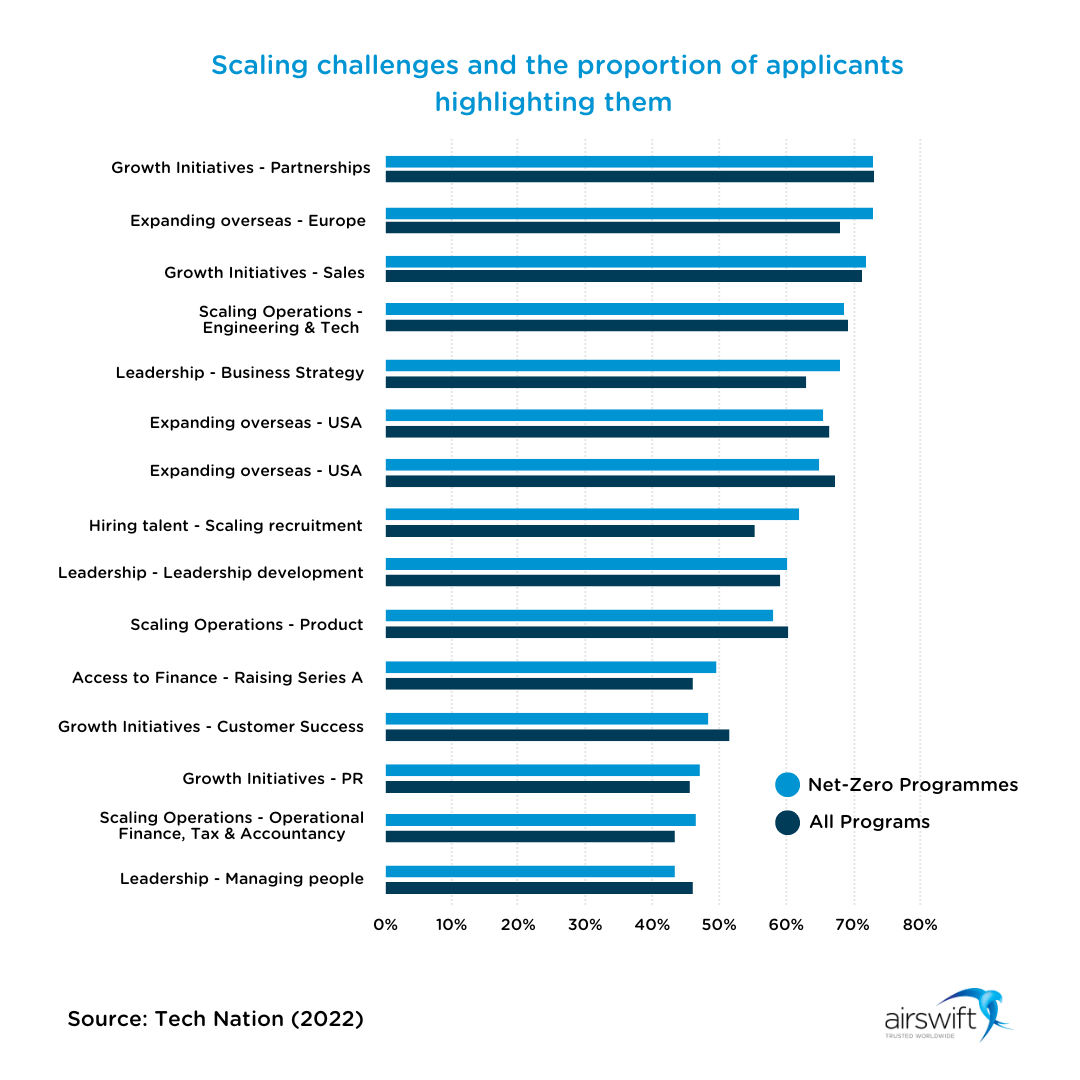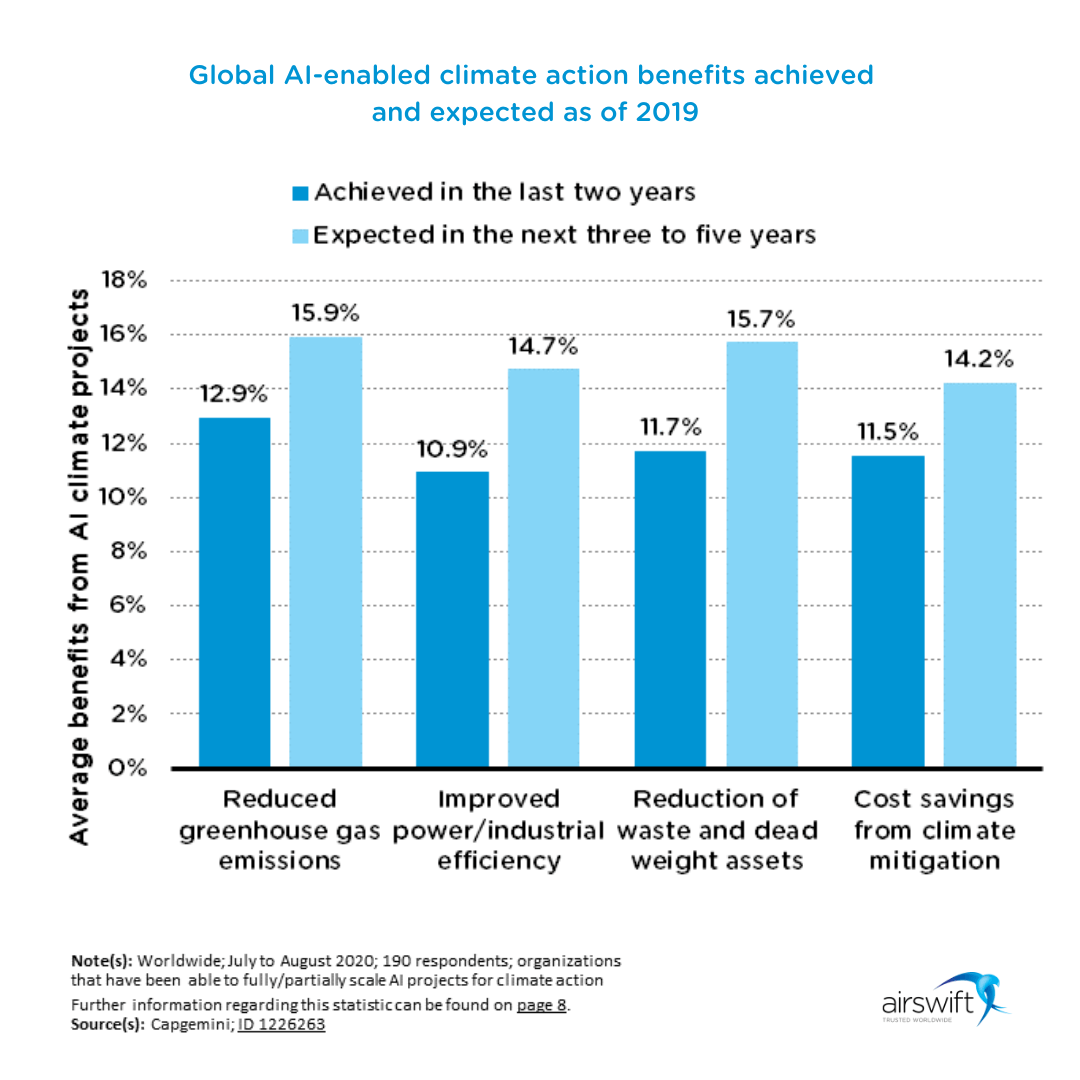These are the top challenges faced by climate tech companies
December 15, 2023
- Home
- Blog

Source: Frame Stock Footage/Shutterstock
Expanding overseas and hiring talent are some of the main issues encountered by green tech leaders
Climate tech has become a hot topic in recent years, with many startups focusing on developing new technologies to help reduce greenhouse gas emissions. But what exactly is climate tech? And what exactly is the difference between cleantech and cleantech 2.0?
Read our article for a comprehensive overview of what distinguishes one from the other and how both are connected to today’s climate tech ecosystem.
What does climate tech mean?
The term “climate tech” gained popularity during the Paris Agreement (2015), and since then, it has been used for technologies that are capable of solving global environmental problems such as air pollution, water scarcity, energy access, food security, and extreme weather events. Climate tech encompasses a wide range of solutions that can be used to mitigate or adapt to these risks.
It is also a way to leave behind the term “cleantech”, which has become associated with misleading claims about the exponential growth of the clean energy sector.
Many previous failures in business led to scepticism amongst investors and venture capitalists who began to doubt the sustainability of a green economy.
Is the climate tech sector a bubble that is about to burst?
There aren’t any signs of bubbles bursting thus far! Things today are drastically different than they were ten years ago. Now we're seeing more mature technologies and governmental policies that are ready to support climate solutions. Plus, it has more venture capitalists in the game and an even strong presence of public-private partnerships.
However, this certainly doesn't mean the sector is without its share of challenges to overcome.
Primary climate tech challenges
According to this 2022 Tech Nation report, there are still plenty of business opportunities for the climate tech industry to expand. However, the study points out some major obstacles that need to be addressed if companies want to scale their operations successfully.
Scaling and Growth are the major issues
Tech Nation compared the startup participants in its Net-Zero programmes with the ones who participated in all programmes in 2022. By doing this, we are able to analyse the challenges matched between the climate tech players and the tech players. For both kinds of startups, the challenges were virtually identical.

It is interesting to note how the top ten in the chart stands out. All of these items show how important partnerships and new hires are for successful business growth.
Scaling Operations (Engineering & Tech) appears at 4th place listed by 68.5% of the climate tech startups (Net-zero programmes). Hiring talent (scaling recruitment) comes at 8th place listed by 61.7% of the same companies.
So, while the climate tech sector is growing, it seems like it needs to focus on expanding its operations first before trying to grow its market share. Plus, it will need to find ways to attract the best talent available. But fortunately, the new generation of skilled workers is environmentally conscious and eager to work for sustainable causes.
Supply chain challenges in the face of COVID-19
Climate technology investments go toward the research and development of innovative new products and services. Therefore, special materials, processes, and tools are necessary for this type of investment. All of this was deeply affected by the coronavirus pandemic.

Supply chain challenges directly impact the ability of companies to innovate. Plus, if the supply chain becomes too expensive, it becomes near impossible for small businesses to compete with large corporations.
For example, most of the solar panels produced in China are shipped to Europe or North America. This process takes time and energy. And when you add up the costs of fuel and other expenses, the price of electricity generated from solar power can increase significantly.
Companies had to cut down R&D spending and postpone projects. Also, it's no longer just about finding raw materials and manufacturing them into final products. There are also issues related to distribution and logistics — many countries have imposed restrictions on imports. In fact, some countries have banned certain types of imported goods altogether.
However, the good news is that the COVID-19 crisis could potentially present an opportunity for the climate tech sector. It's time to rethink our production process and start thinking about the future of manufacturing.
This means that the supply chain is going to change dramatically. We'll see less demand for carbon-intensive products and more demand for renewable resources.
We must not overlook the importance of R&D funding
Bill Gates is a prominent advocate for climate tech, and in the video below, he emphasizes the significance of early investment in research and development initiatives to reduce the costs associated with what is known as the "green premium."
The climate tech sector relies heavily on innovation
We cannot talk about innovation in the climate tech sector without mentioning artificial intelligence technology. This is because AI has been a game changer for almost every industry over the past decade and has an important role to play in overcoming these challenges encountered by the green economy.

Artificial Intelligence (AI) is being used to reduce pollution and cut costs, which can help businesses become more efficient and thus help with their growth initiatives. Even pure tech companies such as Google and Amazon use AI to detect pollution levels in cities and adjust thermostats accordingly.
In short, AI is changing how we live and work. And it's only getting better.
But there's another reason why AI is so important: it's helping us solve problems that humans simply cannot handle alone. For example, AI is now able to identify patterns in data sets that would take years for human analysts to figure out.
So, what does all this mean? For one, it means that the climate tech sector is going to rely more on AI than ever before.
AI-enabled use cases by climate tech companies
Artificial intelligence and machine learning have started to revolutionise the energy sector by enhancing efficiency and optimising resource utilisation. Key contributions of AI and ML in climate technology include:
- Smart Grid Management: AI and ML algorithms can analyse and predict usage patterns, allowing for better distribution and management of energy resources across the grid.
- Energy Storage Optimisation: Machine learning can help predict optimal times for charging and discharging energy storage systems, leading to more efficient use of renewable energy sources.
- Predictive Maintenance: By identifying potential issues before they become critical, AI-driven systems can reduce maintenance costs and extend the life of energy infrastructure.
Climate tech companies cannot avoid artificial intelligence if they want to enhance their business models and achieve sustainable growth. They need to keep pace with AI innovations in order to maximise their performance and thus be able to recruit top tech talent.
Respondents from companies who were already involved in scaling of AI projects for the purpose of mitigating global warming shared their views on the benefits of using such an advanced technology in the field of environmental protection.
A study conducted by the Capgemini Research Institute could provide a comparison between these benefits achieved in the last two years with the ones expected in the next three to five years.

The scalability of AI in the climate tech market faces two big issues. Also, from Capgemini’s study, only 42% of the potential AI applications were actually being experimented on, and more than 80% of the climate tech startups spend less than 5% of climate change investment on AI.
As mentioned earlier, climate tech companies face similar issues to traditional startups when it comes to their ability to scale.
AI is a powerful tool that can help with this scaling. But the trick here is that artificial intelligences have their own set of challenges when trying to scale up, which include more investment and recruiting a skilled AI team.
Want more insight into talent trends in the technology industry? Click the link below to download our latest whitepaper.
Partner and grow your business with Airswift
Some of the most common challenges currently faced by climate tech companies includerecruiting talented employees, growing internationally and finding the right partner to help them navigate these scenarios.
This is where Airswift comes into play. We've helped companies grow globally and recruit top talent in the industry. Our unique approach allows you to focus on your core competencies while we take care of services such as:
- Talent acquisition
- Global Employment Outsourcing
- Workforce & HR Consulting
- Technical Services
- and much more!
Over the past four decades, Airswift has transformed people’s lives by providing international workforce solutions to the engineering and technology sectors. Our global network spans 60 offices across North America, Europe, Latin America, Asia Pacific, Middle East and Africa. With over 9,000 contractors, we have a truly unique ability to deliver a full global service.
We know that every company has its own needs and requirements and our goal is to make sure that each one of them gets exactly what they need. To learn more about our services, get in touch with us to find out how we can support your business at every stage of its growth.

This post was written by: Raphael Santos, Content Marketing Coordinator
You may also be interested in…
-
The Great Crew Change: Bridging the skills gap in engineering
-
Hiring for emerging and disruptive technologies? Discover the in-demand skills and traits
-
Solving the oil and gas skills gap amidst the great crew change
-
Going green: attracting and retaining talent
-
How can power firms improve their environmental image problem?
-
Refining the US petrochemical talent pipeline
-
From Waste to Wealth: how three markets are pioneering carbon tech
-
5 things to check before signing an employment contract
-
Navigating the energy sector: Insights from the 2024 GETI report
-
6 things you need to know about Generation C




